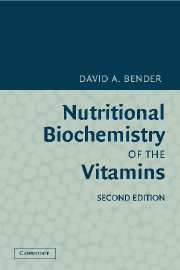Book contents
- Frontmatter
- Contents
- List of Figures
- List of Tables
- Preface
- 1 The Vitamins
- 2 Vitamin A: Retinoids and Carotenoids
- 3 Vitamin D
- 4 Vitamin E: Tocopherols and Tocotrienols
- 5 Vitamin K
- 6 Vitamin B1 – Thiamin
- 7 Vitamin B2 – Riboflavin
- 8 Niacin
- 9 Vitamin B6
- 10 Folate and Other Pterins and Vitamin B12
- 11 Biotin (Vitamin H)
- 12 Pantothenic Acid
- 13 Vitamin C (Ascorbic Acid)
- 14 Marginal Compounds and Phytonutrients
- Bibliography
- Index
1 - The Vitamins
Published online by Cambridge University Press: 03 December 2009
- Frontmatter
- Contents
- List of Figures
- List of Tables
- Preface
- 1 The Vitamins
- 2 Vitamin A: Retinoids and Carotenoids
- 3 Vitamin D
- 4 Vitamin E: Tocopherols and Tocotrienols
- 5 Vitamin K
- 6 Vitamin B1 – Thiamin
- 7 Vitamin B2 – Riboflavin
- 8 Niacin
- 9 Vitamin B6
- 10 Folate and Other Pterins and Vitamin B12
- 11 Biotin (Vitamin H)
- 12 Pantothenic Acid
- 13 Vitamin C (Ascorbic Acid)
- 14 Marginal Compounds and Phytonutrients
- Bibliography
- Index
Summary
The vitamins are a disparate group of compounds; they have little in common either chemically or in their metabolic functions. Nutritionally, they form a cohesive group of organic compounds that are required in the diet in small amounts (micrograms or milligrams per day) for the maintenance of normal health and metabolic integrity. They are thus differentiated from the essential minerals and trace elements (which are inorganic) and from essential amino and fatty acids, which are required in larger amounts.
The discovery of the vitamins began with experiments performed by Hopkins at the beginning of the twentieth century; he fed rats on a defined diet providing the then known nutrients: fats, proteins, carbohydrates, and mineral salts. The animals failed to grow, but the addition of a small amount of milk to the diet both permitted the animals to maintain normal growth and restored growth to the animals that had previously been fed the defined diet. He suggested that milk contained one or more “accessory growth factors” – essential nutrients present in small amounts, because the addition of only a small amount of milk to the diet was sufficient to maintain normal growth and development.
The first of the accessory food factors to be isolated and identified was found to be chemically an amine; therefore, in 1912, Funk coined the term vitamine, from the Latin vita for “life” and amine, for the prominent chemical reactive group. Although subsequent accessory growth factors were not found to be a mines, the name has been retained–with the loss of the final “-e” to avoid chemical confusion.
- Type
- Chapter
- Information
- Nutritional Biochemistry of the Vitamins , pp. 1 - 29Publisher: Cambridge University PressPrint publication year: 2003
- 2
- Cited by



